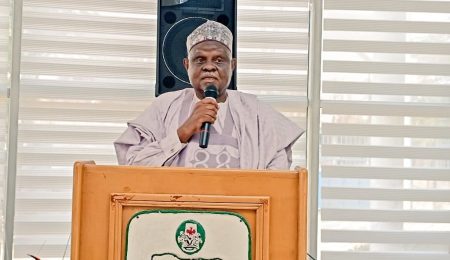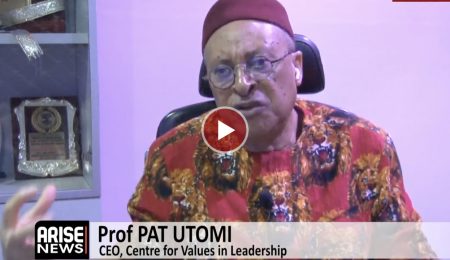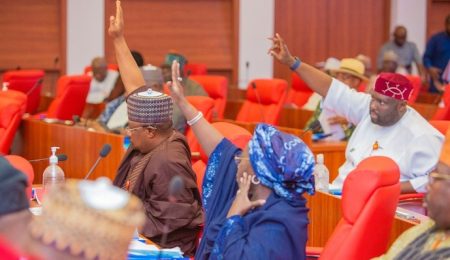Former Director-General of the Nigerian Maritime Administration and Safety Agency (NIMASA), Dr Peterside, has said that the emergence of a new opposition coalition under the African Democratic Congress (ADC) pol is “a welcome development” for Nigeria’s democracy, but warned that personal ambition, lack of clear messaging, and unresolved electoral flaws could threaten its success ahead of the 2027 elections.
Speaking in an interview with ARISE News on Thursday, Peterside said: “A strong opposition is good for the country. The answer is in the affirmative. The second question is: did we have a good or formidable opposition platform before now? The answer is in the negative. And so to that extent, the emergence of the ADC is a welcome development.”
According to him, whether the ADC coalition succeeds in forming the next government is secondary to the fact that its existence could compel the current administration to be more responsive to the needs of Nigerians.
“Any government in power is most likely going to be more sensitive if you have an organised and formidable opposition,” he said. “And being sensitive means it will be more beneficial to the Nigerian people.”
The ADC, which has attracted opposition heavyweights including Atiku Abubakar and Peter Obi—both of whom lost to President Tinubu in 2023—is being seen as a potential political force ahead of the next elections. But Peterside warned against interpreting the coalition merely as a gathering of political grievances.
“ADC in 2013, 2014, 2015 was a coalition. And so we now have another coalition, the ADC coalition. If you put both of them side by side, are we saying it was exclusion, anger, not being part of the table that fuelled the movement in 2013, 2015? Or was it some desire to change the country? I think they’re similar,” he argued.
He described Nigerian politics as a continuous “battle of coalitions” with “similarities and minor or insignificant differences” between them.
On the criticism of President Tinubu’s policies, which the opposition blames for worsening economic conditions, Peterside said: “There are downsides of the opposition and there are upsides of the opposition. The downsides are threats to the opposition—why they may not succeed—like putting personal ambition ahead of national interest, personal ego, personal ambition. I can mention ten.”
He added that “One of the upsides is the perception that the current government has visited Nigerians with hunger, poverty, unemployment. The cost of living crisis is real. So whether the opposition succeeds or not is a function of the performance of the government of the day.”
Asked if the ADC coalition is striking a chord with Nigerians, Peterside was cautious, noting that the coalition was still in its early days. “Nobody has done an empirical study lately, and it’s less than a month that they formally presented the party. Nigerians are optimistic that there’s going to be a formidable opposition, and they’ve yearned for it over time.”
However, he pointed out that the coalition must offer more than just unity—it must present a distinct alternative.
“The ADC has not come out with its message. Nigerian political parties are not ideologically rooted. The public would like to see the ideology, the principles behind the party, how they intend to tackle our multidimensional economic, social, and political problems. They must distinguish themselves,” he stressed.
“For today, they’ve not been able to distinguish themselves yet. Nigerians must be presented with an option. Right now, what we’re seeing is one coalition called APC, another coalition called ADC—battle of the coalitions.”
Peterside, a longstanding advocate of electoral reform, also highlighted the structural challenges that could prevent genuine political change, noting that without significant reforms, opposition efforts could be in vain.
“I’ve been an advocate of electoral reform from my days in the National Assembly. I was robbed of electoral victory because of a heavily flawed process. The National Assembly owes Nigerians a new electoral process that can guarantee transparency and let the people’s votes count. If they can’t deliver on any other thing, they must deliver on that,” he said.
Reflecting on the divisions within Nigeria’s major opposition parties, Peterside expressed doubt that either the Peoples Democratic Party (PDP) or Labour Party could recover before the next elections.
“Personally, I believe that a crisis in the PDP is entrenched. I’m also tempted to believe that the induced crisis in the Labour Party cannot be resolved before 2027,” he said. “It would be simplistic to think that all these crises are just natural occurrences or competition for control. I won’t fall for that kind of trick.”
Turning to his forthcoming books, Peterside spoke about *Beneath the Surface: Essays on Nigeria’s Chequered History*, a collection of 70 essays written between 2020 and 2023.
“It cuts across the economic life of the country, security challenges, political life,” he explained. “In all, we try to address sociopolitical issues, provide solutions, and unearth things unsaid—explaining things to the understanding of the common man. We don’t write for the tough elites. We also don’t write for those with no education at all. So you must have some level of education.”
He revealed that prominent figures including Kenyan scholar Professor P.L.O. Lumumba and diplomat Mohammed Ibn Chambas have praised the essays as “masterpieces.”
Peterside’s second book, *Leading in a Storm: Practical Leadership Strategies in Crisis Situations*, explores the unique leadership challenges in volatile African environments.
“Our environment is characterised by a high degree of uncertainty, volatility, and ambiguity. So if you bring leadership competencies meant for a more stable environment and apply them here, you won’t get the same results,” he explained. “We identified eight critical competencies, including the ability to understand context, achieve calm, sense-making, decision-making, communication, teamwork, learning from crisis, and strategising in unstable environments.”
He added that the book draws extensively from African case studies, such as the Westgate Mall attack in Kenya and the Ebola crisis in Liberia, to highlight leadership strategies suited for Africa’s complex realities.
“It’s about leadership competencies you need to lead in an unstable environment. And most African countries can be described as relatively very unstable, very uncertain, very unpredictable,” Peterside said.
Discussing his forthcoming books, Peterside introduced Beneath the Surface: Essays on Nigeria’s Chequered History, he said, “This is a collection of 70 essays. I’ve written some 200-something essays between 2020 and 2024. However, the publishers agreed that we’ll restrict ourselves to 70 critical essays written between the year 2020 and 2024, 2023 rather. It cuts across the economic life of the country, security challenges, political life of the country.”
Explaining the time frame, he said: “That was based on the advice of our publishers, who continue to write essays every week. But they found a common thread among all my essays. In all, we try to address social issues, sociopolitical issues. We try to provide solutions, and we try to unearth things unsaid. Things that, if we’re dealing with statistical evidence or statistical data, we try to explain it to the understanding of the common man. So we don’t write for the tough elites, the high-level intellectuals. We don’t also write for the man who has no education at all. So you must have some level of education.”
He added that,”Some that are not published are also contained in this book. But what I can say is that Professor Lumumba of Kenya considers it some of the best masterpieces he has ever read.”
He also revealed,“Muhammad Ibn Chambas, who used to be… Okay, yeah. Well, he read a number of those essays and said to me, and he actually praised the collection of essays and said, listen, I’ve had the opportunity of reading essays over a period of… But these are essays in a different class.”
On his second book, Leading in a Storm: Practical Leadership Strategies in Crisis Situations, Peterside explained: “Well, basically, what we’re trying to talk about, deal with, is there are studies done over time. We’ve discovered that some of the challenges we face is because we bring leadership competencies meant for a more stable environment and apply them here. Our environment is characterised by a high degree of uncertainty, volatility, and ambiguity. So if you bring those leadership traits and apply them here, you’re certainly not going to get the same results.
“And so if we operate in a crisis environment, there are eight critical competencies we’ve identified. And I just mentioned them in passing. One is the ability to understand the context. Do you understand the context? Now, the other one is achieving calm. You must have emotional stability for you to make critical decisions. Then the other one is something we call sense-making, and we can talk about it. In sense-making, we can talk about the fact that the way you make decisions in a crisis environment is not the same way you make decisions in a normal environment. So whether decision-making, whether your communication, whether teamwork, whether learning from crisis, whether strategising in an unstable environment, they’re all unique.
“One thing that is unique about this is that we cited a lot of African case studies, almost all African case studies, because very often leaders or researchers don’t take time to study our own situation, whether it was the attack on Westgate Mall in Kenya, whether it’s the emergence of Ebola in Liberia.”
In conclusion, Peterside said: “And so that’s what it’s all about. It’s about leadership competencies you need to lead in an unstable environment. And I bet you most African economies, most African countries, can be described as relatively very unstable, very uncertain, very unpredictable, and that planning here, whether strategising here, making decisions here, require a unique set of competencies.”
Boluwatife Enome
Follow us on:


